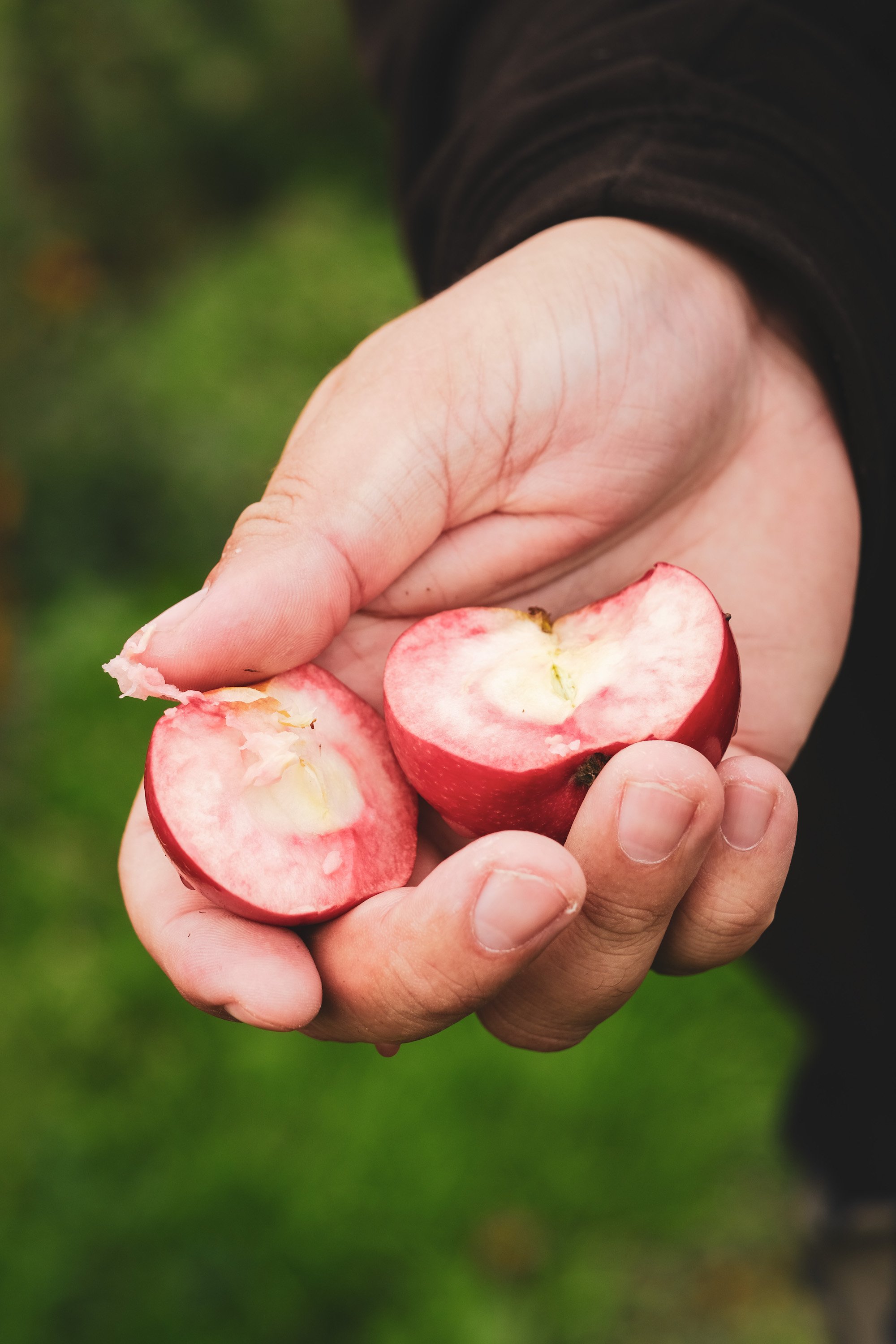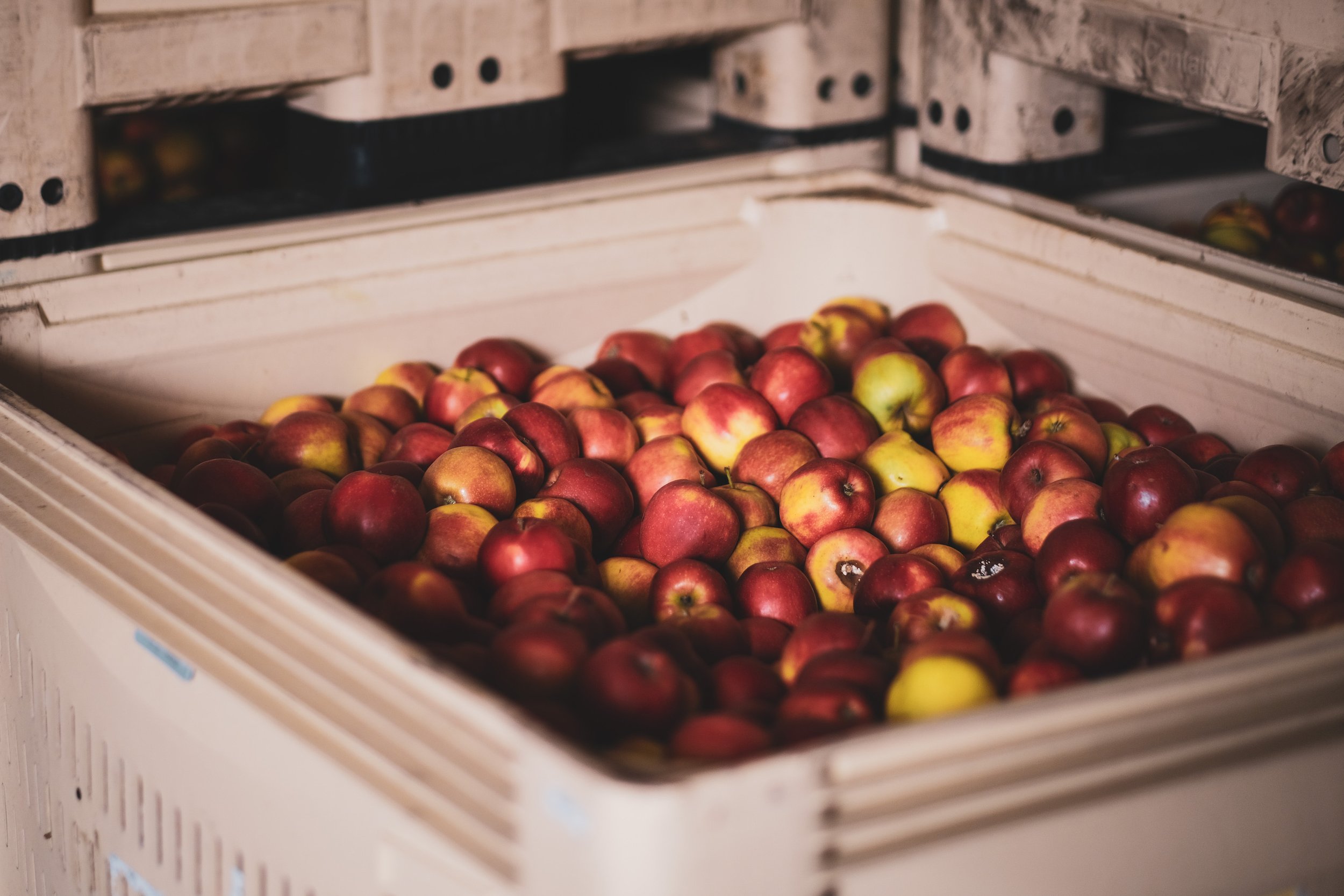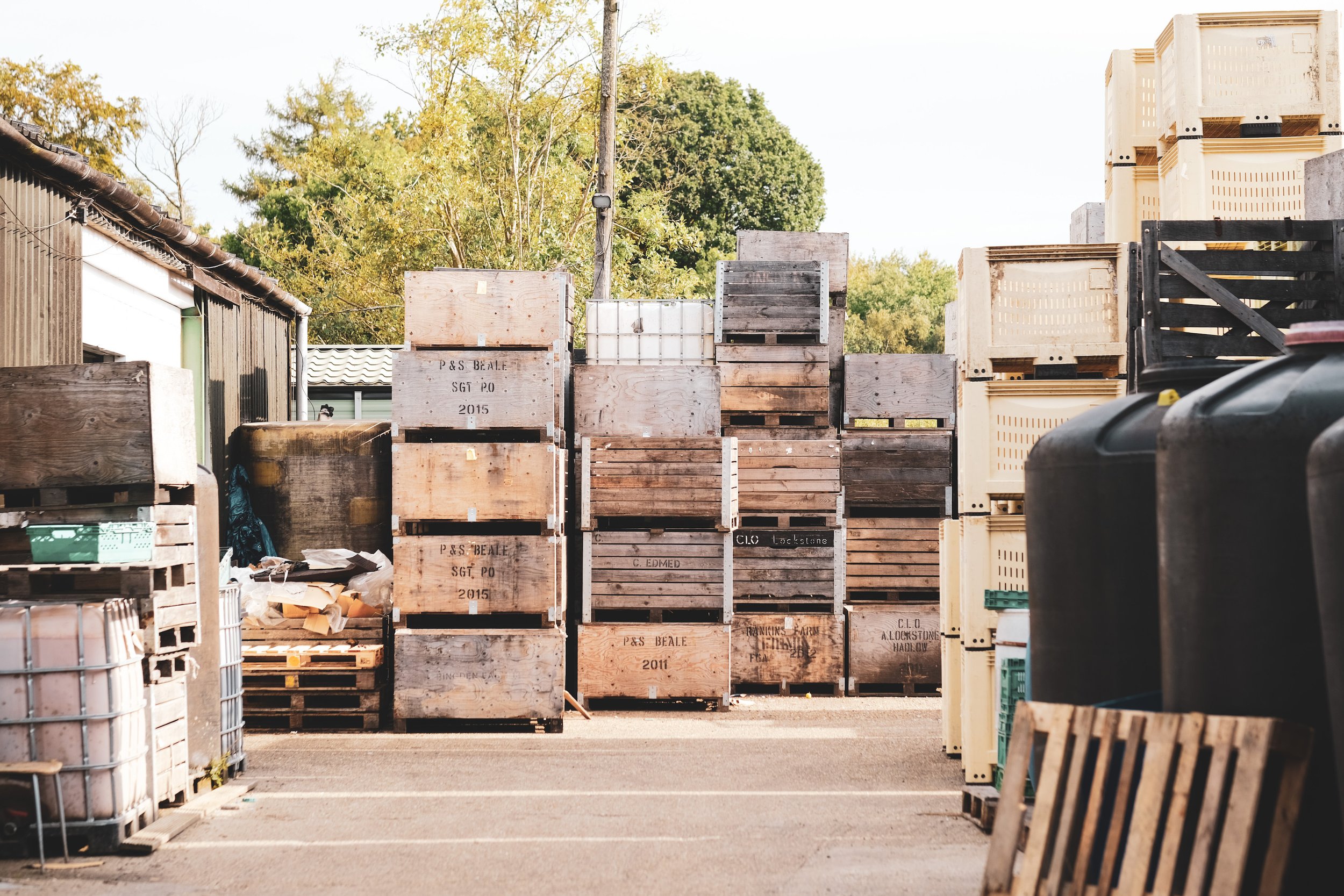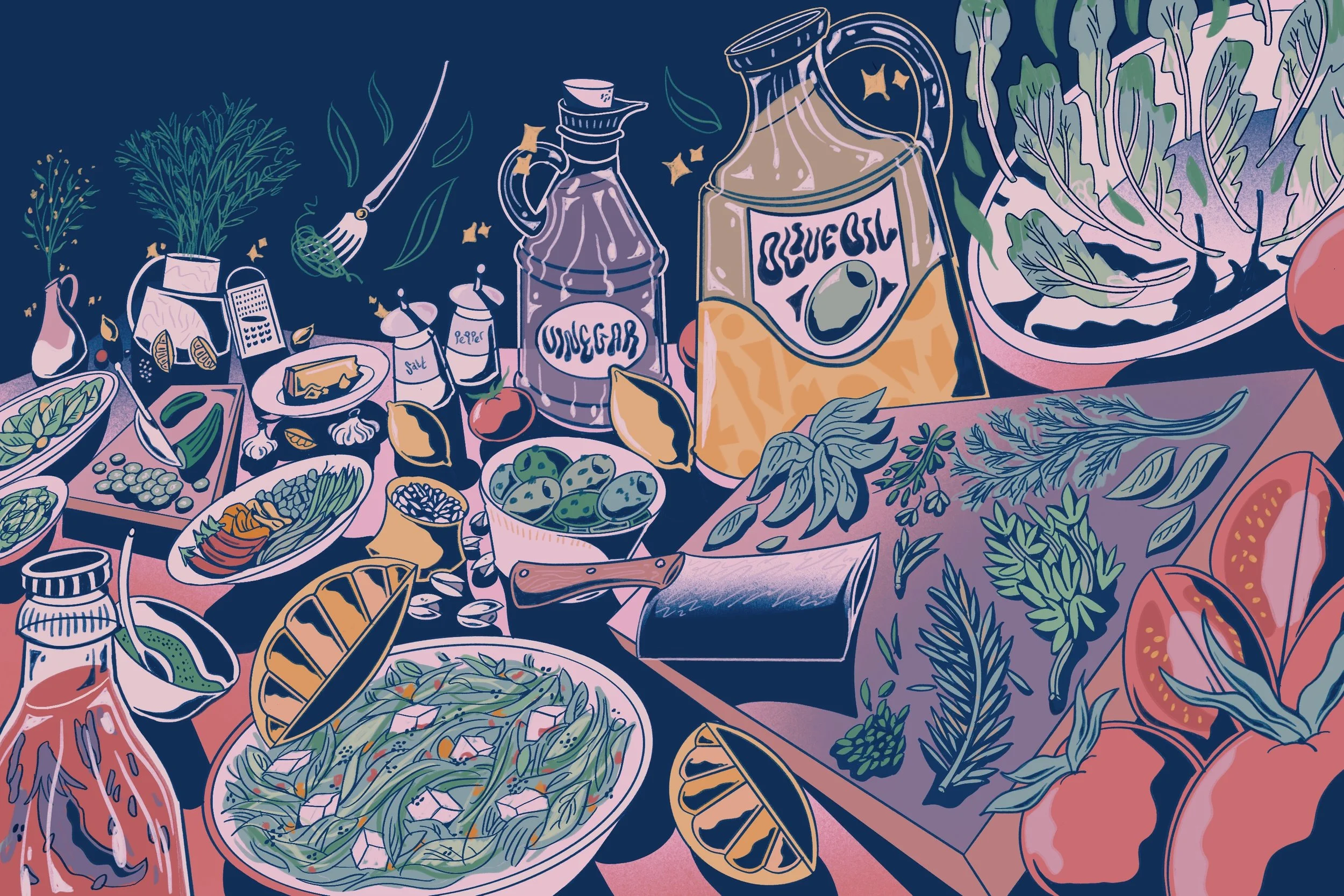Such Great Heights — Ascension Cider in Etchingham, East Sussex
There are two particularly distinctive things about Matt Billing, founder of Ascension Cider.
He’s 6 feet 11 inches tall. You can’t miss him when he’s in the room—but that’s rarely been a good thing for him. Once on a night out he was punched, unprovoked, on two separate occasions, by two different people, just for being big. He didn’t go out for a year after that. Everywhere he went he stood out, and he never felt like he fit in. But he’d rather not talk about that. Ask him about ballooning instead.
Photography by Lily Waite
Matt is a third generation hot air balloon pilot. There’s wonder and whimsy in the way he describes flying above the East Sussex countryside where he lives. He was six weeks old when he took his first flight with his father and grandfather.
Growing up he had posters on his bedroom wall of hot air balloons, and his favourite childhood holidays were spent ballooning. One of his earliest memories is of his grandfather’s balloon, deep blue with graded greens, red, orange and yellow, with white panels printed with Calibre, the name of his car garage. As a six-year-old, young Matthew knew that one day he wanted to own a balloon exactly like it.
When Matt started Ascension Cider as a 25-year-old in 2017, owning that balloon was still his dream, and it would guide him in the right direction, even when he felt like the winds were blowing against him.
***
If you boil fruit cordial you remove the preservatives. Add water, sugar and yeast to it and it’ll ferment. That’s how Matt used to make his ‘tropical fizz’ in his mum’s shed as a 14-year-old. His inspiration to start homebrewing came from an unusual place: a Stiff Little Fingers gig in Brighton.
“I got the piss kicked out of me,” laughs the softly-spoken Matt. He came to the realisation that if he wanted to attend rock shows and get smashed around in the mosh pit––which he did––he’d rather do it drunk than sober.
He went to the local library and took out a book on homebrewing, then joined an online homebrewers’ forum where the helpful members were unaware they were guiding a teenager in his new hobby.
“I was making all manner of filth in my mum’s shed,” Matt says, including fruit wines, beers, ciders, his tropical fizz made with orange and tropical cordial, and other squash-based ferments made with Ribena and Vimto. They were all stored in black plastic barrels and, without the equipment to measure the alcohol content, he labelled each with numbers for how many half pints it took to get him pissed.
He lacked focus in school, and mostly wished he was doing something outdoors, so at 16 he went to college to study fish husbandry. He took his homebrew equipment with him.
“I nearly got kicked out because I was making cider in my dorm room,” Matt says. To stop the smell from spreading, he sealed all the doors and windows in his room.
“I woke up one night and I couldn’t breathe!” he tells me, thinking about how he’d overlooked the carbon dioxide produced during fermentation. “I opened all the windows, all the doors, and the smell of fermenting apples wafted out everywhere and [the student halls warden] came in my room and I had 240 litres of cider fermenting in my cupboard.”
He had to make up a lot of excuses to not get excluded.
Matt reluctantly went to university and enrolled on a business degree, but he hated it, leaving before completing the final year. He worked in a pub for a while, moving from pot wash through most kitchen positions, then to assistant manager, all while still making cider, now in an empty shed behind the pub. When he saw a position advertised at Middle Farm, which sells hundreds of ciders and perries, he applied and got the job.
“Being surrounded by that much cider blew my mind,” he says.
By 2013 he was getting 100 kg of Russet apples from one local farm and 10-15kg of Bramleys from another. He pressed the juice at Middle Farm, took it home where it fermented wild, without adding yeast, to around 9% ABV. As he was mostly brewing to share it with buddies, he’d get fresh-pressed apple juice from Middle Farm and blend that into the strong cider to make it weaker.
“When I started to mix it fifty-fifty, when having pints at a barbecue, I was like ‘oh shit, this is mad.’” He hadn’t tasted a cider like it before, one that had the complexity of a strong, dry cider, and the sweet deliciousness of fresh apple juice.
When the job at Middle Farm ended, there were more pub jobs, some work in a brewery, and then another one, where he also started to make cider, and he did it by scaling up his homebrew approach of brewing a strong cider and blending it back with fresh juice. It was 2015 and he’d finally found a job that was right for him. But it nearly ruined him.
***
That’s something else Matt doesn’t want to talk about. Even years later he’s still dealing with it emotionally and psychologically. He was diagnosed with bipolar disorder in 2016, and having a tough time at work, and in his own head. Those things weren’t connected, but they were impossible to separate. He stopped making cider at the end of 2016, and didn’t think he’d ever do it again.
“Starting again was very hard,” he says, adding that he had to be “dragged out of a pit of despair… I was terrified of failure and rejection.” But people knew Matt as a cider maker, they enjoyed his ciders, and from somewhere rumours began to spread that he was going to start his own thing.
One day he had a call from someone asking to buy cider and Matt had to explain that he no longer worked for that company. No, the person said, I want to buy your cider when it’s ready. But Matt wasn’t ready yet.
It was the encouragement of his partner, Lauren, and his dad, Martyn, that built Matt back up to do it. They told him he was a great cider maker, but he’s not someone who enjoys praise. (With his shy modesty he admits that he’s somewhat baffled as to why anyone would want to read about him and his ciders).
If he was going to start his own thing, it’d be just him, no investors, no one to tell him what to do, and no one to stop him from making exactly the cider he wants, in exactly the way he wanted to. He knew it’d be balloon-themed, so he claimed the social media handles, and added the bio: ‘We make cider for pub and pizza money.’ The self-deprecating tone acting as a kind of protective barrier, just in case.
““I was making all manner of filth in my mum’s shed.””
In the spring of 2017, Matt was offered the use of an old barn apple store on Ringden Farm, near the East Sussex border with Kent, where he’d also be able to use the farm’s apple press, cold store, canning line and pasteuriser. He filled two 1,000 litre plastic IBC’s with juice from Russets and Bramleys and it fermented to 9.2% ABV. He pressed some fresh apples, let the juice settle overnight in the cold room, then blended in equal amounts of juice to cider to create Pilot, a cloudy and juicy 4.6% ABV cider. Not many other ciders were made this way, but this was his way.
Six years after the first batch––social media bio now ‘Super Juicy Ciders – Fruity Bevs – Single Varietals – Wild Ferments – Funky Yeast experiments – Gravity Botherers – Cidernauts’––Pilot is Ascension’s best-seller, available in kegs, cans and bag-in-box.
Matt still makes Pilot and his other ciders the same way, with the only notable difference being that he uses his own yeast blend––a mix of wine, cider and beer yeasts—instead of wild fermenting. He’s also grown to split production between Ringden Farm where he collects the fruit, presses the juice and makes his blends, and a winery-cidery where the juice ferments in 55,000 litre tanks—he ferments after the autumn apple harvest and draws from the batch through the year whenever he’s packaging a new blend.
Almost all his ciders are made with the same house base cider, blended with different juices and different amounts to get the required alcohol content and sweet-sharp-dry flavour profile. Pilot is an equal-amounts blend, while his 8.2% ABV Sonic Titan is the same base cider with just a small amount of fresh juice added. The exceptions are his single varietal ciders and any wild ferments which he still experiments with, and these are usually presented dry and unsweetened, only being released when Matt feels they’re right.
It’s the blending in of the fresh juice, from apples and other fruits, which defines the Ascension ciders. And the fruit is special in its own way.
***
In 2023, Matt will use more than 250 tonnes of fruit, and all of it will have been turned away by the supermarkets for being too small, too big, the wrong colour, oddly-shaped.
“We even get fruits rejected for being too ugly,” says Matt. “I’m like join the fucking team! Welcome to my whole teenage years!” Ascension welcomes all rejects.
“The farmers spend energy and love to grow the fruit, and to be told it’s not good enough for what happens in nature is a travesty,” he says. He’s built relationships with local orchards to get any apples that aren’t wanted elsewhere, and he celebrates the fruit by transforming it into something that brings people pleasure, while also being as natural as possible. That means using only fresh-pressed fruit juice, yeast and carbon dioxide. Nothing else.
“We want to be as open and transparent with people as possible,” Matt says. He force-carbonates his kegs and cans, and chooses to pasteurise his cider, the latter a decision which some people in the cider industry remarked upon negatively.
“We do it because of the really massive juice content. I can’t imagine releasing something and being unsure whether it’s safe or not,” says Matt. “I personally don’t think it affects the flavour in any way, and for me that’s a really great win because it means I don’t have to use large amounts of sulphur dioxide or anything else in there.” The cider is “true to the fruit, true to the people who grow it, and, most importantly, true to the people who drink it.”
It’s not just apples which nature––and shallow supermarkets––brings him. One day, Ringden Farm had an excess of red grapes, so Matt pressed them and blended that into his fermented cider to produce Wrath. Another time, a load of pineapples were available, so that went into his cider along with some lemon juice to make Shimmy. He’s used cranberries, cherries, blackcurrants, even beetroot, and when five tonnes of pears were going spare he blended their juice into his cider and he named it Per, after Per Lindstrand, a legend of hot air ballooning.
Matt initially called these ‘fruit cider blends,’ which had detractors, so he started calling them ‘fruity bevs’ instead. “You can’t denounce that,” he says. “I’ve called it that and it’s my creation and my term for it.” It’s a name, and an approach, that isn’t trying to raise fits, but turn heads towards something new, but it felt like he was being rejected by cider purists.
“I’ve got a massive amount of respect for people who came before me, but I feel like a lot of [cider] people think I don’t because I do things differently,” he says. “That might have been where I felt out of place, because those [cidermakers] may have thought I was a joker making stupid fruit cider out of concentrate, water and sugar,” he says. “I don’t feel like we’ve ever really been accepted by the fine cider crowd.” But, he’ll admit, that’s not where he wants to be, anyway.
***
These are ciders made for the pub, or for where he first drank his juicy blends: in the garden, with friends. Matt isn’t trying to take market share away from 750ml bottles of corked cider and instead wants to take taps away from mainstream brands, giving drinkers the choice of having ciders made with just pure, fresh apple juice and nothing else. Ascension’s ciders are made to please people, to fit in by neither being too strong, too sharp, too dry or too sweet. They have gradually found their place, and not necessarily in the cider world.
“We’re kind of like the cider of the taproom,” says Matt, with the cider’s growing popularity in breweries and beer bars, adding that Pilot has been called the hazy pale ale of ciders with its immediate and simple appeal of being cloudy, juicy, fruity and sessionable. Equally, it’s a cider with complexity for drinkers who are seeking something more, where you can taste the fruit skin, the juice, the natural sweetness, the tartness, and most importantly the apples and other fruits.
With a dozen collaborations with breweries––and plans for some hopped ciders for 2023—Ascension is growing further into the beer space.
“To get in front of so many beer drinkers is fantastic because they all like cider now,” he laughs. “Honestly, the number one thing I hear is that I didn’t like cider until I tried this cider. Or, I don’t like cider, but I like your cider.”
Being in more pubs and beer venues means more people are seeing and trying Ascension Cider, often as a side-step from beer or wine. “I’m told this is a gateway cider,” Matt says, “and I kind of went ‘ah, fuck off’ in the beginning because this isn’t a cider to get you to a better cider.” For a long time, imposter syndrome made him feel like the cider wasn’t being fully accepted for what it is, and he doubted what he was doing, but now there’s earned confidence in how Matt sees his ciders, and how he talks about them.
“As soon as I drink Pilot, it just brings me joy,” he says. “It’s just a joyful little bevvy.” And he’s more aware of where it fits: “It’s a great cider that will bring people into the industry to drink cider,” he says. “I hate the term inoffensive and easy-drinking, but fuck it, we all need that, and I don’t care if your journey stops or starts here.”
For some, it does stop there. His cider has become their cider. He thinks about that for a moment. “It’s become people’s drink,” he says, smiling.
***
“Fucking hell, that’s delicious!” is a common reaction to someone having their first taste of Ascension Cider according to Greg Mitchell, owner of Bottle Grove in Eastbourne, which sells the full range of ciders and fruity bevs alongside a big beer selection.
“My favourite kind of customer is someone you’ll mention a cider to and they screw their face up and say ‘Oh, I don’t drink cider,” says Greg. He’ll slide a taster of Pilot across to them. “The next thing you know they’re three pints down. It changes people’s perception of cider, which I think is a great thing. It’s not too sweet, not too dry, it’s just juicy. It’s just perfect,” he says. “Genuinely people just love it.”
“It really just tastes like a fancy apple juice,” says Nick Wilson, general manager of The Evening Star in Brighton. Pilot is the pub’s best-selling cider. “It appeals to people who want something unusual, but also to somebody who just wants a pint of cider that’s straight-forward and completely delicious.”
““It appeals to people who want something unusual, but also to somebody who just wants a pint of cider that’s straight-forward and completely delicious.””
The Evening Star typically has three Ascension ciders on, including a fruity one and the stronger Sonic Titan, which was first made for the pub. “If we didn’t have Sonic Titan the customers would be up in arms!”
Pilot is also the house cider at Abyss Brewing in Lewes, where it’s more than just a good cider on tap.
“Matt’s values are really in line with ours,” says Alice Healey, events and taproom manager. “His use of waste apples was a big thing for us, and he’s local to us, so it’s a sustainable choice,” she adds. “And he’s just the nicest man in the world!”
***
For Ascension’s first five years, Matt did everything himself: cider making, pressing, blending, packaging, sales, deliveries, and accounting. He was wary of giving up the control that he felt he needed to hold in the beginning, but eventually he had to let others in.
“Ascension is bigger than I am,” he says. “Letting go of that was scary, but my god has it worked.” His partner Lauren joined in May 2022 as head of sales, then came Ben, who does all the jobs around the cidery––blending, packaging, deliveries––and Martyn, Matt’s dad, who helps with the accounting.
“I don’t know what I’d do without them,” Matt tells me. And it’s led to them continuing to grow, month by month, year by year, and start to receive wider recognition. Thanks to this acceptance, he’s become used to confidently defending his ciders.
“If you’re not going to understand what I’m doing, I’m not going to explain it to you again,” he says, his tone accepting, not challenging. “I felt like, for quite a while, that I’ve had to prove to people that I have a place in this world…” he takes a moment. “If I haven’t done that by now then maybe it’s their problem.”
***
Matt stopped hot air ballooning in his teens, only rediscovering it in 2017, by which time his grandfather and father had both stopped flying and had sold their balloons. It was a chance meeting with an old family friend and an invitation to join them that took him flying as an adult. “I felt instantly at peace,” he says.
Since starting to fly again he’s got his pilot’s licence, met some of his ballooning heroes––the people he had posters of as a kid––and he’s attended some of the world’s most famous events. He’s even been a question on the BBC’s current affairs-based game show Have I Got News For You, based on an article he wrote for the ballooning journal, Aerostat. The headline read: “_______ and ballooning an unlikely combination.” No one guessed that the missing word was cider.
When Matt started Ascension Cider his ciders stood out as being different, which he often struggled to see as a good thing. But six years of making his fruity bevs, his way, and he’s finally comfortable with where he is, and having found a place where he belongs. “The beer side, they just seem to get me,” he says. “Despite all of my weirdness, I feel at home with them.”
With his cider becoming increasingly well-known around the UK, and with Matt standing out as the biggest guy in the place, often in his black 5XL Ascension Cider hoody, it’s common for people to notice him. “I used to hate being so conspicuous because it was almost always negative,” he says. “Now it’s always good. I’m happy with how people view me.”
He still talks about six-year-old Matthew’s aim to have a hot air balloon in the same design as Calibre, his grandfather’s balloon. “When I started Ascension that was always the goal,” he says. “It’s been my life’s dream to have a balloon in that style with my company on. I thought in 30 years’ time, we’ll have that.”
In the spring of 2023, Matt bought the balloon.


























































